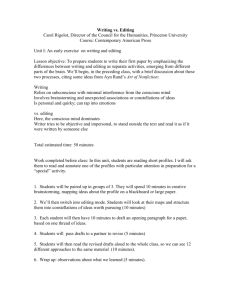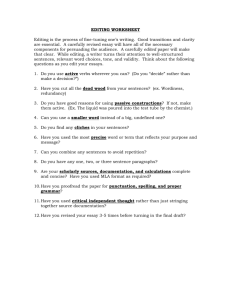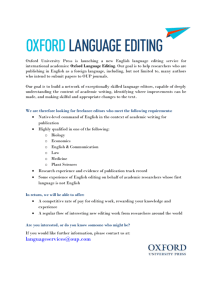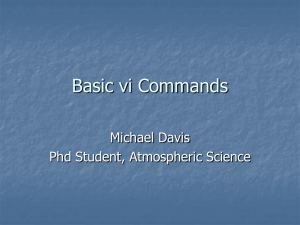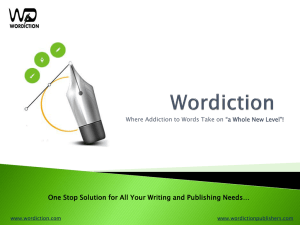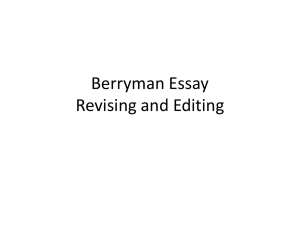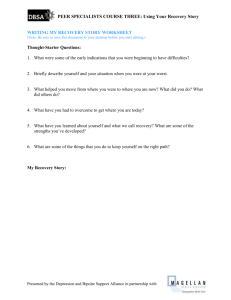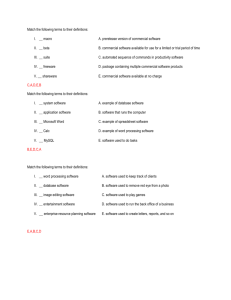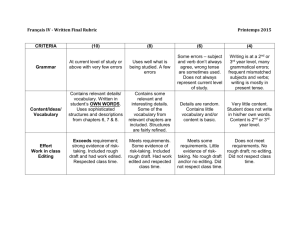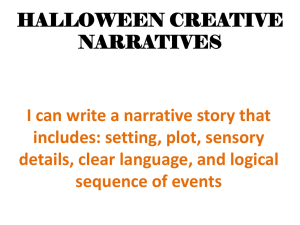English 4010: Scientific and Technical Writing
advertisement
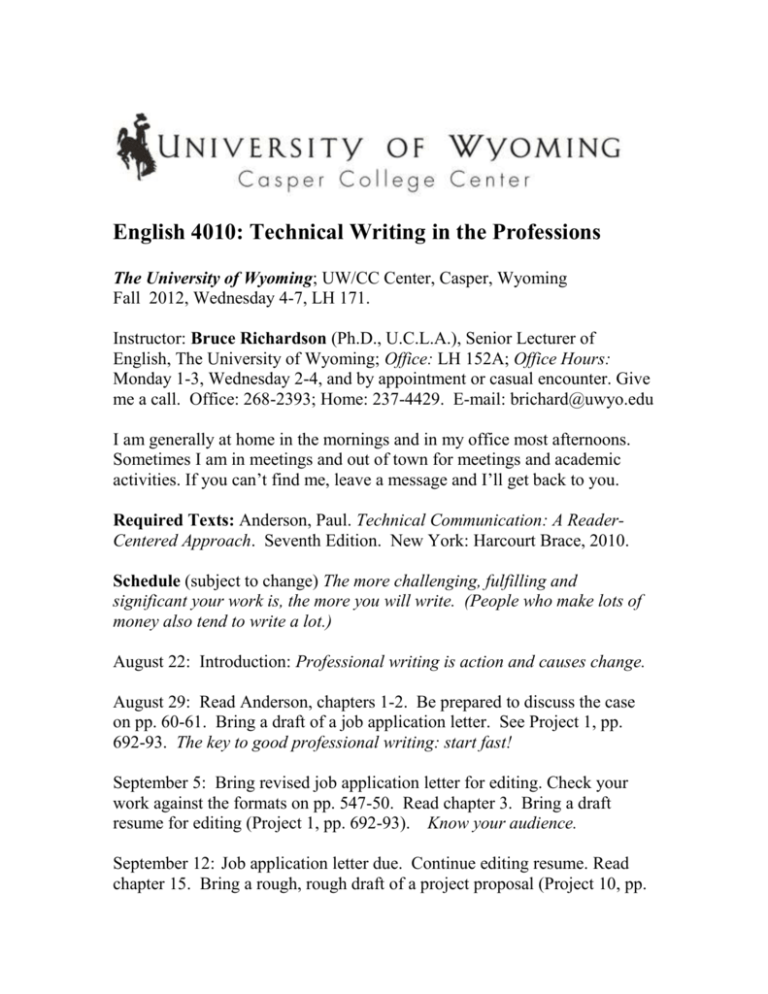
English 4010: Technical Writing in the Professions The University of Wyoming; UW/CC Center, Casper, Wyoming Fall 2012, Wednesday 4-7, LH 171. Instructor: Bruce Richardson (Ph.D., U.C.L.A.), Senior Lecturer of English, The University of Wyoming; Office: LH 152A; Office Hours: Monday 1-3, Wednesday 2-4, and by appointment or casual encounter. Give me a call. Office: 268-2393; Home: 237-4429. E-mail: brichard@uwyo.edu I am generally at home in the mornings and in my office most afternoons. Sometimes I am in meetings and out of town for meetings and academic activities. If you can’t find me, leave a message and I’ll get back to you. Required Texts: Anderson, Paul. Technical Communication: A ReaderCentered Approach. Seventh Edition. New York: Harcourt Brace, 2010. Schedule (subject to change) The more challenging, fulfilling and significant your work is, the more you will write. (People who make lots of money also tend to write a lot.) August 22: Introduction: Professional writing is action and causes change. August 29: Read Anderson, chapters 1-2. Be prepared to discuss the case on pp. 60-61. Bring a draft of a job application letter. See Project 1, pp. 692-93. The key to good professional writing: start fast! September 5: Bring revised job application letter for editing. Check your work against the formats on pp. 547-50. Read chapter 3. Bring a draft resume for editing (Project 1, pp. 692-93). Know your audience. September 12: Job application letter due. Continue editing resume. Read chapter 15. Bring a rough, rough draft of a project proposal (Project 10, pp. 699-700). Read chapter 23. Send me an e-mail message introducing yourself and outlining your goals for the class. People read actively. Test your writing to see if readers respond as you expected or if they add a twist of their own. September 19: Resume due. Bring a draft of your project proposal for editing. Review chapter 23 and read chapter 8. Do exercise 1 or 2 on pp. 93-94; use the worksheet on pp. 91-93. Professional writing may be started by one person, but is completed by many. September 26: Project Proposal Due. Read Chapter 5. Bring a draft of an unsolicited recommendation for editing (Project 5, pp. 695-96). Always have someone read that letter before you send it. Speling erors and typoos can ruin your efforts. October 3: No class. Follow my dad’s advice: “Do what the person before you did, unless it was stupid.” Get models, study them and use them for your own purposes. Want to be a better writer? Every day read some good prose aloud. October 10: Unsolicited Recommendation due. Read chapter 27. Bring a draft of Instructions (Project 7, pp. 697-98). Read chapter 9, pp. 257-79; do exercises 2-5, p. 283-84. Professional writing may be started by one person, but is completed by many. Get used to being edited and working in groups. October 17: Instructions due. Bring a draft of a progress report for editing (Project 11, p. 700). Read chapter 26. Bad thinking equals bad writing. Think your ideas through, write them out, do more research and have honest, forthright people read what you have written and tell you what’s wrong with it. October 24: Apply for a scholarship at UW/CC (see the UW/CC website); bring a draft application essay for one of the scholarships there. Progress Report Due. Read chapters 6-7. Begin editing projects. Remember your reader and have sympathy. She’s tired. Help her out by starting fast with your main point, using sections and labels and concluding with your recommendation October 31: Edit Projects; Conferences and Workshops as needed. . Scholarship application due. Read chapters 10-11. Want to be a better writer? Circle all of the “is-are-was-were” verbs and replace as many as you can with action verbs. November 7: Edit projects. I hope you never write or say “hopefully” when you mean “I hope,” that you do not boldly split infinitives unless introducing a Star Trek episode, that you use apostrophes to indicate that it is Alan Simpson’s idea, not yours and you use no apostrophe for “its” when it’s a possessive pronoun (his, hers, yours, ours, its). Got that? November 14: Edit projects. Projects due this week. Want to be a better writer? Vary the length, rhythm and beginnings of your sentences. Counting words can help, but reading your work aloud, with gusto and exaggerated emphasis—as if you were, say, Patrick Stewart—reveals the dull stuff and makes the juicy moments come alive. November 21: Bring a draft Information Page for editing. Projects returned. Information page due. Tell your reader why she should care about what you have written. Why should she? Will she read it? Make sure she does. November 28: Information page due. Get used to being edited and working in groups. December 5: Revised projects due. People like good news. Give them some. December 12: Final. How do you get to Carnegie Hall? Evaluation Application letter: 5% Resume: 5% Project Proposal: 10% Unsolicited Recommendation: 10% Instructions: 5% Progress Report: 5% Scholarship Application: 5% Information Page: 5% Major Project: 30% Attendance, Editing, Homework, Participation: 20% What is Professional Writing? For an answer, read Paul Anderson’s discussion of writing at work (pp. 510). Remember that professional writing is action and is designed to cause other people to take action. College sorts of papers that simply demonstrate your knowledge of a subject are not professional writing and not acceptable for the major project or other writing in this class. What is acceptable? I want writing that aims to initiate change. Such writing includes grant proposals, reports with recommendations, scientific papers that report the results of a specific experiment or study (these should be in a publishable format), business plans (such as S.B.A. proposals), proposals (such as to the School District to initiate a program or revise some curricula) and other writing projects that could potentially have an impact on the policies, procedures or behavior of professional people. I encourage students to use work they have already done or are doing during the semester for a job or another class. Real world writing is best, though occasionally good papers can be done using hypothetical situations. Papers from past 4010 classes in Casper have resulted in additional funding for the local Agricultural Extension office, new computers for The Nicolaysen Art Museum, revised agency regulations, new office procedures, new school programs and a variety of other changes and improvements. We want writing that can lead to a better world or, at least, a slightly improved one. General Outcomes Desired: --Write concisely, accurately and logically, following the conventions of standard English and using critical thinking, proper development, prewriting and revising. --Understand the audience of the particular writing activity and the conventions that the professional audience addressed expects to be followed by the writer. --Be able to develop, recognize and employ evidence and analysis appropriate to the issue addressed and the professional context in which it occurs. --Employ the appropriate conventions and style for the audience addressed. --Be able to evaluate the effectiveness of your own writing and that of others in persuading the appropriate audience to take the actions you desire. --In your writing recognize and adhere to generally accepted ethical standards. WC Standards This class is approved for upper-level writing credit (WC) in The University Studies Program. As such it will involve substantial writing that adheres to professional standards, work on drafts and revision of drafts. Policies 1. When you turn in an assignment for a grade, include your final revised paper, one or more draft copies, edit guides and any other evidence of editing. 2. We will discuss the major project extensively, but be advised that it must be a professional paper, tackle a complex problem, be divided into sections, include formal opening matter and have ten to fifteen pages minimum of written text. Professional work and professional sorts of assignments done for other classes or in the practice of a profession may be used for the project. 3. Late papers are accepted with a penalty of half a grade for each day overdue. 4. Drafts are due during the class session specified. 5. Revised versions of graded assignments will be regraded. The final grade will be a ratio between the two grades. The first grade will count 2/3 and the grade on the revised assignment will count 1/3. Turn in any revisions within two weeks of receiving the paper and be sure to include the first graded version along with your revision. 6. Any student who submits a plagiarized paper will receive an “F” for the class and be subject to disciplinary action as defined by university regulations (UW Regulation 6-802 “Procedures and Authorized University Actions in Cases of Student Academic Dishonesty”) These are available at http://www.uwyo.edu/generalcounselsupport/clean%20uw%20regulation s/UW%20Reg%206-802.pdf In appropriate cases, I will also inform the owners of the plagiarized document who may pursue legal action against the offender. Be aware that the faculty has access to programs that identify papers borrowed from published sources and the internet. According to the “Style Sheet” from the U.C.L.A. English Department, “plagiarism is the use of another’s ideas or words as if they were one’s own” (5). Be sure to acknowledge any borrowed ideas or quotations. If you have questions about difficult cases, see me. Work Cited: Department of English, U.C.L.A. “Style Sheet.” (1974). 7. Attendance is essential to your success in the class and, as you shall see, the success of others. Anyone who misses more than two classes will have their course grade lowered one full grade. Additional absences may result in a failing grade. If you know you will miss class sessions you should consider withdrawing and taking the class during another semester when you can attend. 8. Accommodations will be made for students with recognized disabilities as outlined at: http://www.uwadmnweb.uwyo.edu/udss/facultyandstaff/tipsforteaching.asp
